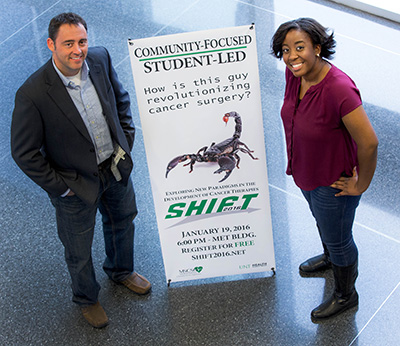‘Big concepts’ in cancer treatment

By Alex Branch
When students in the Master of Science program in Medical Sciences sat down to plan a community service project, they weren’t interested in anything routine.
“We wanted to make an impact,” student Rhett Butler said. “We wanted to do something that has never been done at UNT Health Science Center.”
Butler, Erica Onwuegbuchu, Victoria Chu and other class members will achieve that at 6 p.m. on Jan. 19 when several cancer experts from across the U.S. converge at UNTHSC for SHIFT 2016, a symposium organized by students and focused on exploring new paradigms in the development of cancer therapies.
The free event brings future medical professionals together with the community they will serve to explore local solutions to major issues in healthcare, Butler said. Local cancer advocacy groups, students and the public are invited.
“We’re excited to invite the North Texas cancer advocacy community onto our campus and introduce them to some really big concepts,” Butler said.
Presentations
- Eugenie Kleinerman, MD, MD Anderson Cancer Center, on the financial and regulatory obstacles to novel drug development
- Colin Correnti, PhD, Fred Hutchinson Cancer Research Center, on the revolutionary therapy “tumor paint,” an experimental substance derived from scorpion venom
- Christopher Jordan, DO, UNT Health Science Center, on the economics of treating cancer in Tarrant County.
“I applaud the initiative that Rhett and his fellow students in the Medical Science program have demonstrated,” said Meharvan Singh, PhD, Dean of the Graduate School of Biomedical Sciences. “Such passion and commitment is inspiring and a testimony to their genuine interest in serving the public.”
The Master of Science Degree in Medical Sciences program is designed to provide students opportunities to enhance their credentials for admittance into medical school.



![Uyen Sa Nguyen Scaled[58]](https://www.unthsc.edu/newsroom/wp-content/uploads/sites/16/Uyen-Sa-Nguyen-scaled58-145x175.jpg)

Social media